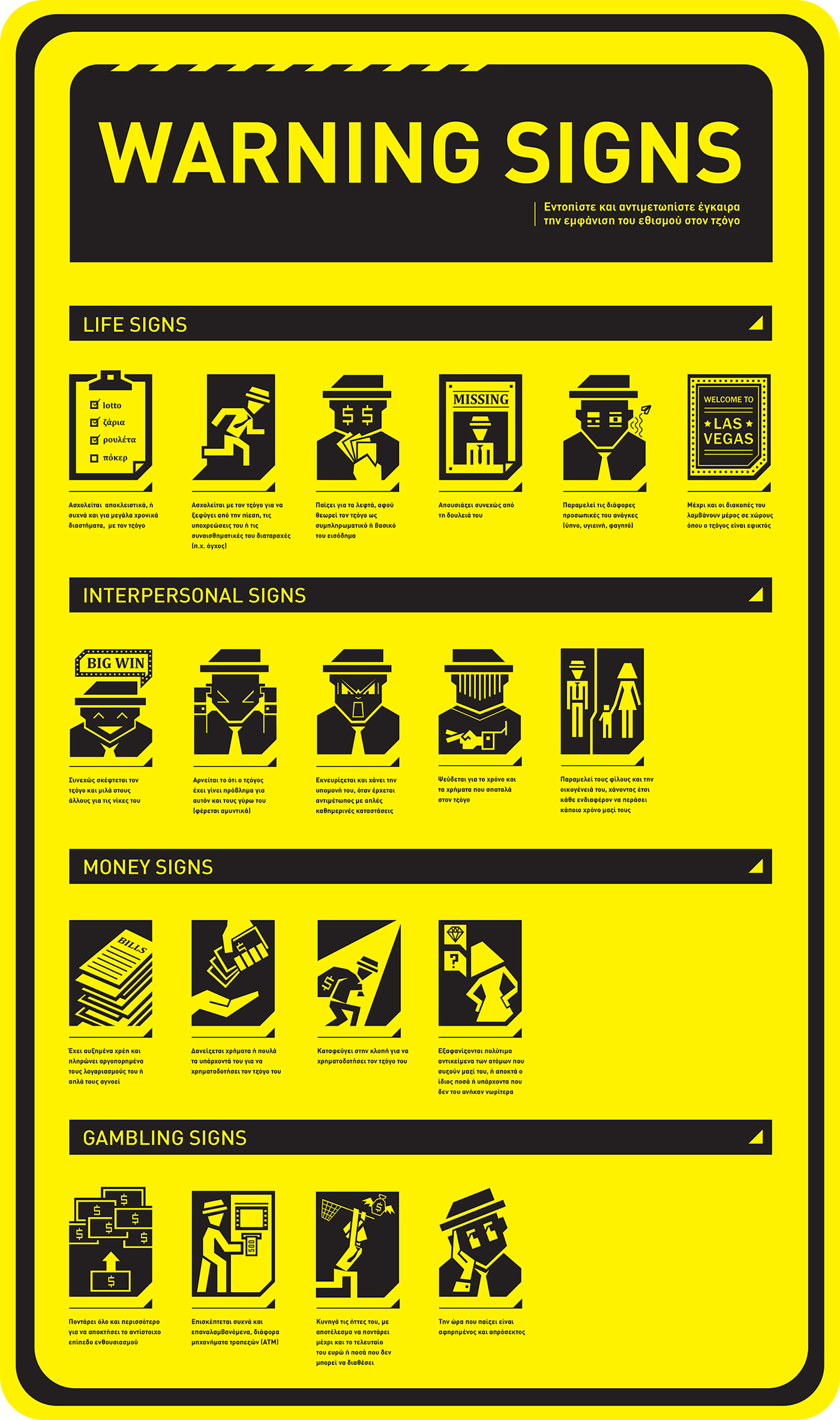- Warning Signs Of Compulsive Gambling Disorders
- Warning Signs Of Compulsive Gambling Behavior
- Warning Signs Of Compulsive Gambling Addiction
- Warning Signs Of Compulsive Gambling Laws
With the Big Game upon us next Sunday, America is in the throes of one of the biggest gambling binges of the year. How can you tell when gambling goes from 'a little harmless fun' to a crippling addiction?
Gambling addiction is no joke and can impact people from all walks of life. Many people think that process addictions -- gambling, eating disorders, sex, shopping, spending, gaming -- are less serious than a substance use disorder. However, gambling affects the brain in a similar way as drugs or alcohol, activating the same areas of the brain and giving people a similar high. It's equally as damaging and just as compulsive – especially given the immediate access to gambling through smart phones. The consequences can affect families, careers, and lives just as severely. Therefore, it's just as critical to end the shame and stigma associated with gambling and empower families to seek support.
Many times, I have a patient who is deep into gambling addiction, and the family will insist the patient must be addicted to drugs. However, he or she is not using drugs. The compulsion to gamble becomes so all-consuming that it mirrors the use of chemical substances. Erratic behavior can manifest in a very similar way – lying, staying out late, stealing money.
So, what are the signs of a gambling problem?
Many people view problem gambling as a 'hidden addiction.' That's because unlike substance use disorders, which have more obvious signs — a smell on the person's breath or clothes, or intoxicated behaviors — gambling has no apparent physical indicators. It could even be as discreet as someone spending a little bit more time on their phone than usual. Casino resorts in denver colorado. By the time you understand what is going on, the person may have already developed a true gambling problem.
Council on Compulsive Gambling of Pennsylvania, Inc. PO Box 444 Spring House, PA Office Phone: 215-643-4542 Josh Ercole, Executive Director Cell: 267-968-5053. Compulsive gambling is a disorder that affects millions in the U.S. Golden moon casino philadelphia mississippi phone number. Get the facts on gambling addiction causes, risk factors, symptoms, signs, diagnosis, treatment, negative effects, complications, and support. Additional signs of problem gambling may include frequent absences from home and work, excessive phone use, withdrawal from family, personality changes (increased irritability/hostility) and diversion of family funds. It's important to realize that problem gambling can affect anyone. Like other behavioral addictions, gambling addiction is a controversial idea. Many experts balk at the idea that gambling can constitute an addiction, believing that there has to be a psychoactive substance that produces symptoms, such as physical tolerance and withdrawal, for an activity to be a true addiction.
How can you recognize the early warning signs of problem gambling before it turns into something worse? Check out this video and read more about what to watch for:

Information about gambling and college students, including the risks, warning signs of a problem and ways to seek help. Gambling Gambling is the act of betting (risking money or personal belong-ings) on a game's outcome that is uncertain or depends on ‘skill' or chance. Some examples include lottery, at home poker, office pools.
Change in Mood or Personality
There's no denying that 2020 has been a stressful year for just about everyone, and many of us may be more depressed or irritable than usual. But if someone shows a sudden change in behavior that doesn't seem to be related to any external factors such as a job loss or concern for a loved one, then you may want to try and get to the source of the change. Someone who is beginning to have a problem with gambling may show some of the following behavioral changes:

- Getting frustrated easily or lashing out
- Appear anxious or agitated frequently
- Feel depressed or hopeless
- Become more withdrawn
Change in Free Time Activities
Has someone close to you changed how they spend their free time? Some of us may have had to cut back on activities we used to enjoy, like frequenting the gym or participating in a weekly game night with friends. However, if an avid reader or musician suddenly stops practicing their hobby and is spending more time away from home or gambling on their phone or computer, then it's possible that they are developing a problem. If they become defensive and deny it, they may be trying to hide how often they gamble.
Warning Signs Of Compulsive Gambling Disorders
What Should You Do If Someone Is Showing Signs of a Gambling Problem?
Warning Signs Of Compulsive Gambling Behavior
The earlier you notice the signs for a potential gambling problem, the sooner you can act. Here are some tips on how to start the conversation:
Help Is Always Available Through 800-GAMBLER
Warning Signs Of Compulsive Gambling Addiction
Taking care of the mental health of both yourself and loved ones during a pandemic and heading into the holiday season is more challenging than ever. If you think that you or someone you know is showing the early warning signs of a gambling problem, don't hesitate to get help. Find the resources you need to get started on our website or contact our free, confidential helpline any time at 800-GAMBLER.

Information about gambling and college students, including the risks, warning signs of a problem and ways to seek help. Gambling Gambling is the act of betting (risking money or personal belong-ings) on a game's outcome that is uncertain or depends on ‘skill' or chance. Some examples include lottery, at home poker, office pools.
Change in Mood or Personality
There's no denying that 2020 has been a stressful year for just about everyone, and many of us may be more depressed or irritable than usual. But if someone shows a sudden change in behavior that doesn't seem to be related to any external factors such as a job loss or concern for a loved one, then you may want to try and get to the source of the change. Someone who is beginning to have a problem with gambling may show some of the following behavioral changes:
- Getting frustrated easily or lashing out
- Appear anxious or agitated frequently
- Feel depressed or hopeless
- Become more withdrawn
Change in Free Time Activities
Has someone close to you changed how they spend their free time? Some of us may have had to cut back on activities we used to enjoy, like frequenting the gym or participating in a weekly game night with friends. However, if an avid reader or musician suddenly stops practicing their hobby and is spending more time away from home or gambling on their phone or computer, then it's possible that they are developing a problem. If they become defensive and deny it, they may be trying to hide how often they gamble.
Warning Signs Of Compulsive Gambling Disorders
What Should You Do If Someone Is Showing Signs of a Gambling Problem?
Warning Signs Of Compulsive Gambling Behavior
The earlier you notice the signs for a potential gambling problem, the sooner you can act. Here are some tips on how to start the conversation:
Help Is Always Available Through 800-GAMBLER
Warning Signs Of Compulsive Gambling Addiction
Taking care of the mental health of both yourself and loved ones during a pandemic and heading into the holiday season is more challenging than ever. If you think that you or someone you know is showing the early warning signs of a gambling problem, don't hesitate to get help. Find the resources you need to get started on our website or contact our free, confidential helpline any time at 800-GAMBLER.
Warning Signs Of Compulsive Gambling Laws
Sources:
